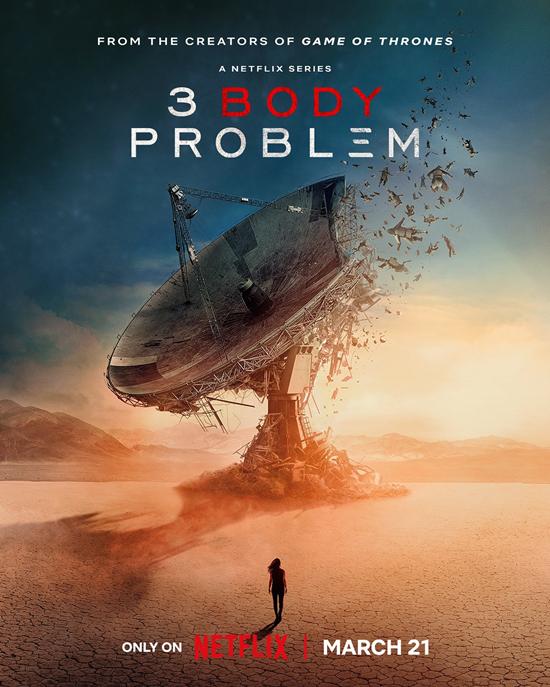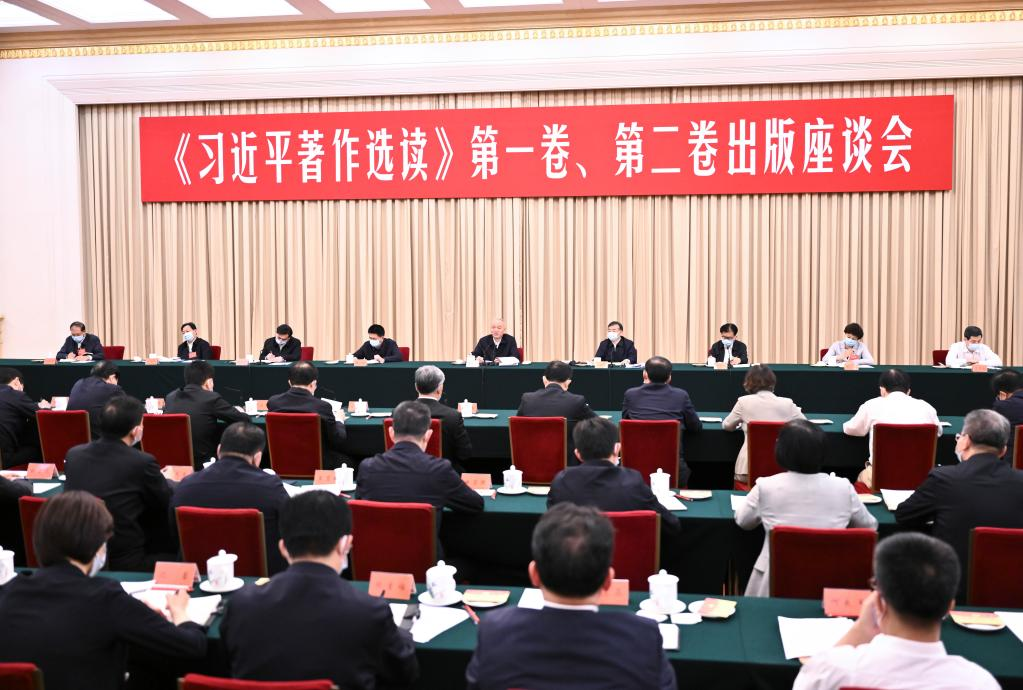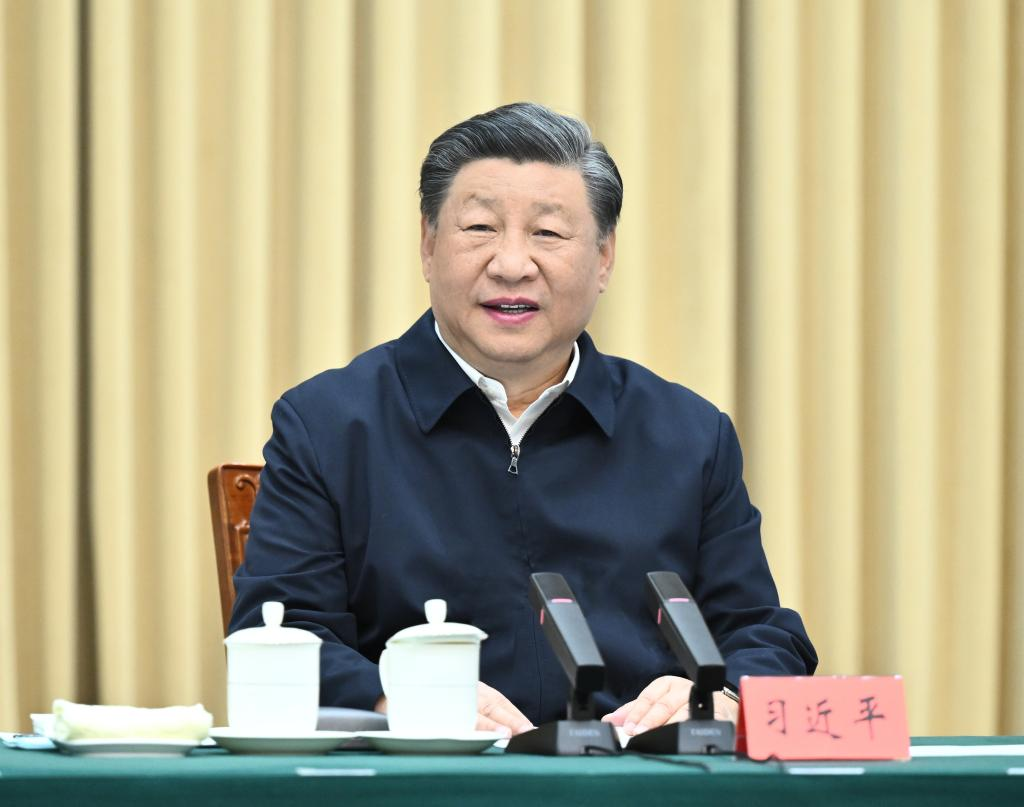During the premiere of "3 Body Problem," the eight-episode first season of Netflix's adaptation of the Chinese sci-fi classic novel "The Three-Body Problem," Wu Yan, a sci-fi scholar, writer and professor at the Southern University of Science and Technology, was visiting Europe for sci-fi exchanges and keenly observed the novel's appeal overseas.

A poster for "3 Body Problem." [Image courtesy of Netflix]
"At a Norwegian bookstore, I saw a huge display section for 'The Three-Body Problem,' which is a rare sight overseas for a Chinese writer," Wu told China.org.cn. "Many Sinologists I met told me that more and more foreigners want to learn Chinese because of the novel."
The Hugo Award-winning novel, hailed as the holy grail of Chinese science fiction, was penned by Liu Cixin, China's most celebrated sci-fi author. According to both Chinese and international publishers, the novel has sold 30 million copies worldwide, with over 4 million of these translated into 35 foreign languages.
The novel's success has also spawned a wide array of derivative works and merchandise, including comic books, radio and stage dramas, exhibitions, TV series, and animated adaptations. These have collectively amassed a co-branded consumer market value surpassing 2 billion yuan ($276 million), according to Zhao Jilong, CEO of The Three-Body Universe, which now holds the rights to the sci-fi saga.
In September 2020, The Three-Body Universe granted Netflix the rights to develop an English-language original series, which is now available in more than 190 countries and regions. This adaptation has exposed Chinese science fiction to its largest global audience yet.
The "3 Body Problem" series has garnered generally positive reviews. On Douban, China's leading review aggregation website, it scored a 6.9/10 rating based on more than 100,000 user reviews. The series also has a user rating of 7.7/10 on IMDb and a 79% approval rating on Rotten Tomatoes. However, in China, a significant number of critics have vocally expressed their disapproval. Criticisms ranged from the adaptation's perceived lack of faithfulness to the original novel, including drastically altering main characters and dividing one character into several roles, to accusations of intentionally making China look bad.
Yan Peng, deputy director of the sci-fi film commission for the China Science Writers Association (CSWA), praised the adaptation for its bold reconstruction of character relationships and the story's logic. However, he noted:" With only eight episodes, there's not enough space to explore the characters' inner worlds and grand themes. However, the series is easy to understand, which should still benefit the promotion of the original Chinese novel."
Sci-fi director and screenwriter Zhang Xiaobei echoed the sentiment but noted: "Even though we have different views on understanding the story, we should be happy to share this story with humanity worldwide and not give up the opportunity for a good Chinese story to spread globally. We should watch on with confidence and tolerance to see how it is interpreted in different cultures."

Science fiction author Liu Cixin answers questions from readers in Beijing, capital of China, Aug. 29, 2015. [Photo/Xinhua]
Legendary Japanese game designer Hideo Kojima also weighed in, saying creators David Benioff and D.B. Weiss had brilliantly sublimated the work into entertainment for everyone while retaining the essence of the original. He expressed confidence that it will inspire more people to revisit the original story. "In any case, 'The Three-Body Problem' is said to have been 'read by all mankind.' Those who have not yet read it will be able to experience it through this drama. Especially for those who are tired of Hollywood blockbusters, this crazy, novel science fiction is sure to be a blast," Kojima said.
Indeed, following the Netflix release on March 21, the novel has surged in popularity, with its English translation topping Amazon's literary fiction bestsellers and reaching 11th in general bestsellers. Additionally, the comic adaptation, "The Three-Body Problem, Part One," nominated for best graphic story or comic at this year's Hugo Awards and selling over 600,000 copies, has been translated and published in five countries – the U.K., the U.S., Japan, Italy, and most recently, France.
Kojima also endorsed the Chinese adaptation of the "Three-Body" series by Tencent Video. In a tweet on X, Kojima recommended the 30-episode series to fans of the original novel worldwide. A new, streamlined 26-episode anniversary version of the widely praised series was released just days before the Netflix series premiered.
Yao Haijun, deputy editor-in-chief of Science Fiction World magazine, which first published the serialized version of "The Three-Body Problem" in 2006, said the Chinese sci-fi industry is now in what he calls the "Three-Body Era," and it could last for quite some time. "I also hope that one day, a new megastar like Liu Cixin will emerge to usher us into a new era," Yao added.

The comic adaptation, "The Three-Body Problem, Part One," has become popular in China and overseas. [Image courtesy of Guomai Culture & Media and Eight Light Minutes Culture]
Liu himself has previously expressed confidence in Netflix but has remained silent about his views on the adaptation since its debut. However, he recently spoke to The Guardian, stating that he would like people to "realize what the greatest uncertainty facing humanity is" and hopes that "the '3 Body Problem' series will make people look up at the starry sky from their busy and trivial lives, even if it's just for a moment."
 US CPI accelerates to 3.5% in March
US CPI accelerates to 3.5% in March Xi underlines prioritizing people's safety
Xi underlines prioritizing people's safety India's top court refuses to hold appointment of election commissioners
India's top court refuses to hold appointment of election commissioners Xi's article calls on young officials to shoulder mission of the times
Xi's article calls on young officials to shoulder mission of the times Sports betting roundup: Scottie Scheffler was a popular pick at the Masters, and then he won
Sports betting roundup: Scottie Scheffler was a popular pick at the Masters, and then he wonColombia's capital announces new measures to cut water consumption as dry weather persists
 BOGOTA, Colombia (AP) — The mayor of Colombia’s capital on Monday announced new measures to reduce w ...[Detailed]
BOGOTA, Colombia (AP) — The mayor of Colombia’s capital on Monday announced new measures to reduce w ...[Detailed]IOM assists in voluntary return of 133 Pakistanis from Libya
 (Xinhua) 10:06, March 27, 2024TRIPOLI, March 26 (Xinhua) -- The International Organization for Migra ...[Detailed]
(Xinhua) 10:06, March 27, 2024TRIPOLI, March 26 (Xinhua) -- The International Organization for Migra ...[Detailed]Senior CPC official stresses study of Xi's works
 (Xinhua) 09:32, May 23, 2023Cai Qi, a member of the Standing Committee of the Political Bureau of th ...[Detailed]
(Xinhua) 09:32, May 23, 2023Cai Qi, a member of the Standing Committee of the Political Bureau of th ...[Detailed]IOM assists in voluntary return of 133 Pakistanis from Libya
 (Xinhua) 10:06, March 27, 2024TRIPOLI, March 26 (Xinhua) -- The International Organization for Migra ...[Detailed]
(Xinhua) 10:06, March 27, 2024TRIPOLI, March 26 (Xinhua) -- The International Organization for Migra ...[Detailed]Lightning, rains kill 49 in Pakistan as authorities declare a state of emergency in the southwest
 ISLAMABAD (AP) — Lightning and heavy rains have killed at least 49 people across Pakistan in the pas ...[Detailed]
ISLAMABAD (AP) — Lightning and heavy rains have killed at least 49 people across Pakistan in the pas ...[Detailed]With so many prospects playing well in the minors, Orioles GM has some tricky decisions ahead
 BALTIMORE (AP) — Orioles general manager Mike Elias faces a fascinating challenge in the coming week ...[Detailed]
BALTIMORE (AP) — Orioles general manager Mike Elias faces a fascinating challenge in the coming week ...[Detailed]Chinese premier stresses boosting high
 (Xinhua) 08:21, April 14, 2023Chinese Premier Li Qiang, also a member of the Standing Committee of t ...[Detailed]
(Xinhua) 08:21, April 14, 2023Chinese Premier Li Qiang, also a member of the Standing Committee of t ...[Detailed]Xi stresses greater efforts to build beautiful Xinjiang in pursuing Chinese modernization
 (Xinhua) 08:06, August 28, 2023Chinese President Xi Jinping, also general secretary of the Communist ...[Detailed]
(Xinhua) 08:06, August 28, 2023Chinese President Xi Jinping, also general secretary of the Communist ...[Detailed]Marinos see off Shandong to seal first ACL semis
 Yokohama F. Marinos edged Shandong Taishan 1-0 in the AFC Champions League quarterfinal on Wednesday ...[Detailed]
Yokohama F. Marinos edged Shandong Taishan 1-0 in the AFC Champions League quarterfinal on Wednesday ...[Detailed] FORT WORTH, Texas (AP) — Sam Mayer made a last-lap pass and held on to win by a matter of inches ahe ...[Detailed]
FORT WORTH, Texas (AP) — Sam Mayer made a last-lap pass and held on to win by a matter of inches ahe ...[Detailed]Much of central US faces severe thunderstorm threat and possible tornadoes

Overseas experts hail Xi's notion of building modern Chinese civilization
